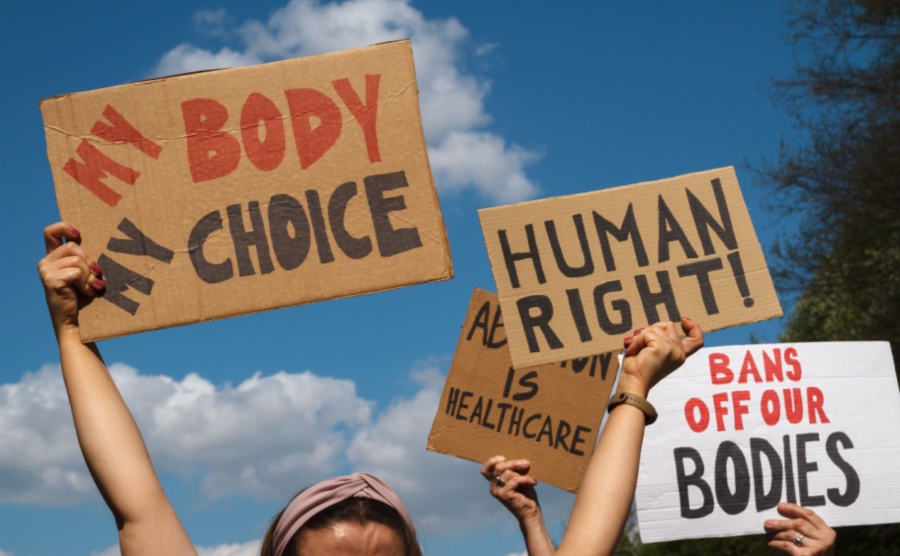On Friday 8th March, France enshrined the guaranteed right to abortion into its constitution. Following French lawmakers voting officially in favour of the motion the previous Monday. The timing of the formal inclusion of this change into the constitution, on International Women’s Day, was no coincidence. France sent out a powerful message of support to women, backing their right to free choice appearing to reflect the views of the majority of French citizens.
Justice Minister Eric Dupond-Moretti used a 19th-century printing press to seal the amendment into constitution.
While the rest of the world remains divided over the issue of abortion rights, it seems that France is very much aligned on its view. With an overwhelming majority of votes, easily passing the threshold of those required, the vote seemed to very much reflect and add weight to pubic feeling on the subject. A public poll by IFOP shows that 85% of the public support the amendment to the constitution. President Macron is now looking to encourage the EU to follow suit by adding this to their Charter of Fundamental Rights. Stating with the intention that “today is not the end of the story, but the start of a fight.”

Protesters fighting for the right to abortion
Find homes in France via our property portal.
The significance of this ruling
During the ceremony on Friday, a 19th-century printing press was used to formally seal the amendment. Then applause erupted through the Place Vendome as France officially became the first country in the world to explicitly guarantee the right to abortion within its national charter. The strength of feeling over this ruling marked perhaps a stark contrast to other countries. This moment was hailed as a guaranteed promise to the women of France to “never roll back this freedom”. In addition sent a strong message to women of other countries, that France supported their right to freedom of choice.
“If we don’t give up, in the end, we win”.
It also validated the long-running belief and tenacity of Mélanie Vogel. The senator who first tried to make abortion a constitutional right in late 2022. Having been told she would never get this motion passed, she announced that this serves as an important lesson for feminists, stating “If we don’t give up, in the end, we win”.

On March 2, 2024, France made history by making abortion a legal right
Abortion rules in France
Abortion in France was originally legalised in 1975. Since then it has been authorised by successive acts of Parliament, meaning that these rights could have been revoked, should the majority of lawmakers agree. Since 2012, the cost of this procedure has been covered (in its entirety) by national health insurance. The time limit within which one can seek a termination has also been increased over time. Originally having been set at 10 weeks evolving to, at present, 14 weeks. Medical abortions are possible up until 7 weeks, with surgery required thereafter.
Abortion in France can be carried out in a multitude of places. Including hospitals, clinics, and family planning centres, by certified health professionals. However, with the caveat that any medical practitioner reserves the right to refuse to operate. In cases where they should they object. They must then, however, bound by law, direct the patient to another avenue through which they can actively seek help.
If you would like to be connected with a trusted lawyer in France, Your Overseas Home can help
Implications
This new ruling now means that any legislation looking to revoke these rights would face censure by the Constitutional Council. This is the body that rules if new laws are fully compliant with the Constitution. By definition, this means that revoking this move, now becomes a much complicated business. Which could only be facilitated by calling an exceptional joint session of parliament (as well as securing majority votes), or through a ruling decision of a public referendum. This clearly shows France’s determination to stand by its decision when it comes to this highly emotive subject.
Perhaps the strength of feeling on this subject is not surprising. With one in three French women reportedly having undergone this procedure at least once. Pro-life organisations however do exist in France, but with seemingly little influence.

The ruling is great news but finding a practitioner could prove tricky in the early days
Challenges ahead
The biggest challenge is cited as being a practical one. Finding a location to grant access to the service. Made harder as many abortion clinics have been closed over the past decade. Due to the absence of services within some areas, some people are forced to travel miles. To seek the professional services that they are very much in need of. This issue, once again, highlights a known inequality of getting the necessary care required in France, depending on postcode. In addition, some clinics do not offer a choice of methods. Even if still within the time frame that allows it. Resulting in some patients arguably being forced into a method of termination not of their choosing, due to insurmountable travel times to clinics offering the method they would prefer.










